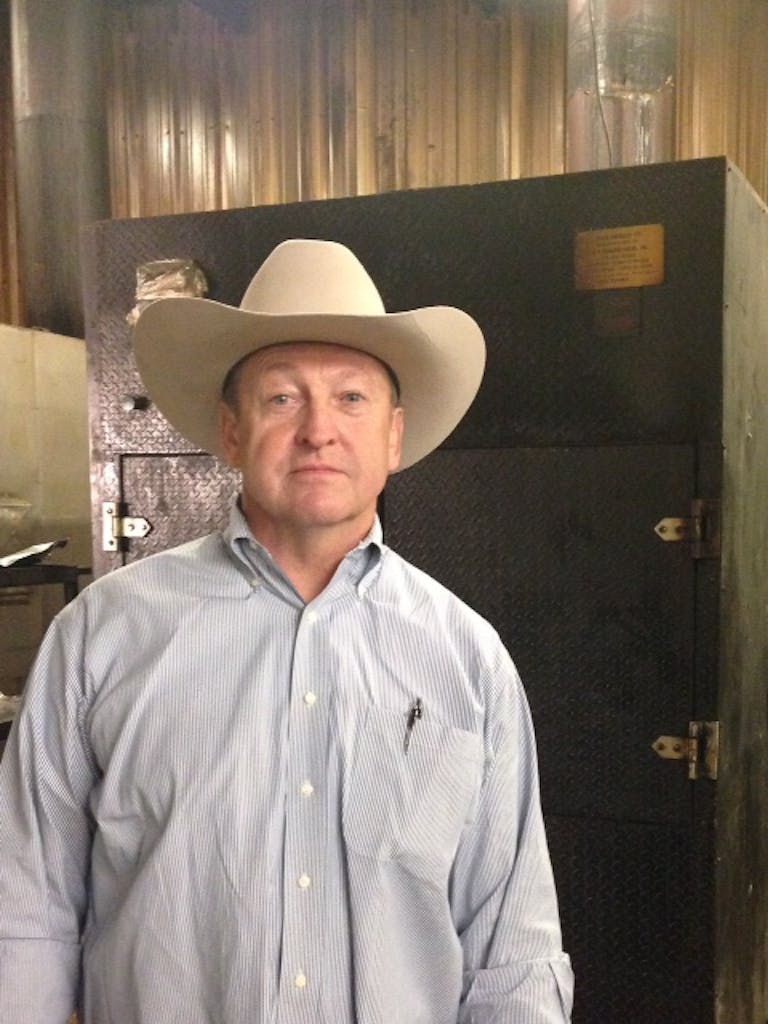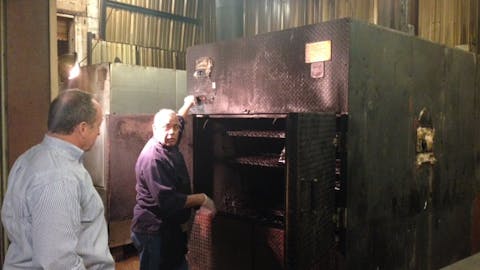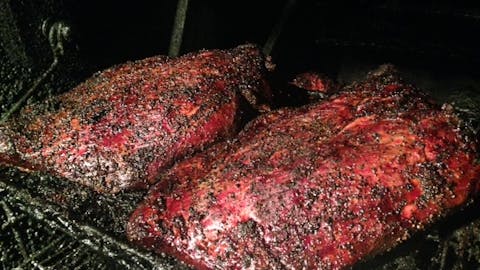 Owner/Pitmaster: Eddie Deen and Co.; Opened 1994
Owner/Pitmaster: Eddie Deen and Co.; Opened 1994
Age: 58
Smoker: Wood Fired Rotisserie Smoker
Wood: Hickory
In the last twenty years, Eddie Deen has quietly built a barbecue empire. His restaurants include Crossroads BBQ in Arlington, Hickory Roots BBQ in Terrell, and Eddie Deen’s BBQ in Rockwall. There’s also a giant event space south of downtown Dallas called the Eddie Deen Ranch, but the lifeblood of the whole operation doesn’t have a sign on it.
An enormous commissary kitchen in Terrell, Texas is where most of the food for Deen’s restaurants, and all of it for his booming catering business, is cooked. It houses the smokers where 800 briskets were cooked for the most recent Texas governor’s inauguration, and every inauguration since 1995. Presidents and dignitaries have dined on barbecue from this kitchen, but you’d drive right past it without noticing.
Deen’s legend has been built through barbecue, but his passion is for community outreach. Through educational programs at Carter High School and Soul’s Harbor homeless shelter, both in Dallas, he has helped send people down a path toward success, and that might begin as an employee at one of his restaurants. They fit right in because the life principles Deen teaches in those programs are also applied into the way he chooses to run his barbecue business.
Daniel Vaughn: How did you learn to barbecue?
Eddie Deen: Self discovery.
DV: Where did that self-discovery happen?
ED: I got out of Texas A&M in 1979. My family owned a marina on Lake Tawakoni. I came off a farm in Wills Point where my mom cooked three meals a day from the garden and the farm. My first experience of a T.V. dinner was at a friend’s house. It was an enchilada dinner or something, and I’d never seen anything like that before. My subjective experience was always based on high quality food. Everything was from scratch. When I got back to the marina, the lake was three miles wide and you couldn’t see the other side. I built a dance floor and a stage. Then I built a barbecue joint and it expanded and expanded. Then I got into the catering business, and that’s where my focus has been.
DV: What was that first place called?
ED: Eddie’s Restaurant at Lakeview Marina. That was in 1980.
DV: How did you move from the restaurant business into the catering business?
ED: In barbecue everybody was knocking on my door asking for catering. The first event I did was at a high school. I had no concept on how much food to bring. I had too much of this and not enough of that. Then, I got hooked up with Ray Hunt and was catering a couple hundred events a year at Fountain Place. George Bush heard that I was Ray Hunt’s barbecue guy when he was running for governor. He ate the food and said it was the best he’d eaten while running for governor, so my name went in the hat to cater the inauguration. They looked at eighty caterers, then cut it down to eight of us. We all went to Austin for a tasting. My bid was actually the highest, but I could explain to them how I was going to execute it. It’s all about protecting the customers experience. Everybody else was talking about their barbecue, but my job wasn’t to serve barbecue. It was to make him look good and look like he knew what he was doing.
DV: When was that?
ED: 1995.
DV: You’ve done all the Texas inaugurations since then, so I’m guessing you didn’t have to audition again.
ED: Basically, you have to earn your keep. The people who hired us are happy because we’ve protected their interests. It’s all perception. The first one was 14,000 in 45 minutes, the second one was 15,500 in 38 minutes. I guaranteed Rick Perry that everyone would be fed in 30 minutes. We fed 13,500 in 29 minutes. The plane flies over with the governor, and it’s time to eat. There were media people looking for stories, so some of them were timing us.
DV: How many Texas inaugurations have you catered?
ED: All of them since 1995.
DV: How many people are you planning to feed this year?
ED: 17,000. The first one for each governor is always the biggest. Perry’s in 2007 was so cold we fed more homeless people than those coming for the inauguration. It was like 20 degrees.
DV: Who tells you how many people to plan for?
ED: The governor’s office.
DV: How early do you have to start cooking for 17,000 people?
ED: Brisket you’ve got to do ahead. Chicken and sausage is the day of.
DV: For the briskets, do you smoke them then freeze it to store them?
ED: We’ll smoke them up to a certain point, then when we reheat it to get it up to its sweet spot. We’ll smoke it all in Terrell, then finish it in Austin on Colorado Street. I have a gooseneck trailer with ovens that’s loaded up and we have some smokers.

DV: How much meat will you cook?
ED: Four tons of meat. There will be about 700-800 briskets. We’re working with Kiolbassa Sausage in San Antonio. We figure they’ll donate about a mile of sausage.
DV: And how lines will you need to serve all these people in 45 minutes?
ED: Forty rows, so eighty lines total.
DV: Back before you were catering inaugurations and you were learning to barbecue, was it all just trial and error?
ED: Most people think there’s such a thing as external teaching, but there’s not. It’s just interest in learning. All teachers are actually the learner. I can’t teach you anything without you setting the stage. I can facilitate and put it into context, but teaching does not equate learning. I just happened upon this path, but barbecue is really a tool to open up other doors. We catered over 87,000 guests for President Bush. If my brisket was tough that wouldn’t be 87,000, it would have stopped at the first 300. It gets back to how do you set the stage. How do you make sure there’s air in the basketball?
DV: Air in the basketball?
ED: For the last decade I’ve been teaching at homeless shelters. I teach people how to go back and change adverse childhood experiences. When these folks are born, they’re like a basketball. What’s in the basketball is love for learning, love for life, curiosity, and imagination. What’s happened if you’re on a pathway to prison is that someone came along and put a knife in that basketball – sexual, mental, or physical abuse. That person becomes what we call a trail horse. It’s like you take a colt and mortify that horse of spirit. You turn off the light switch. If the body and brain of the horse is a ship, we disenfranchise the captain. We disconnect the captain from the ship, and that’s what happens to people. They feel inadequate, unlovable, and unimportant, so they look extensively to fill up the basketball. Next thing you know, they become adrenaline junkies. Now the brain goes into survival mode because there’s no captain. It starts drifting. The only thing they can react to is the neurotransmitter representing the crack cocaine, or stealing, or the gun. What I do is go back to help them change adverse childhood experiences to get air back in the basketball. We do that with school kids at Carter High School [in Dallas].
DV: You’re working with a shelter and with students from Carter, right?
ED: Yes. Soul’s Harbor is the shelter. At Carter High School we have 110 kids in the program. There’s typically not a knife to the basketball, it’s a needle. There’s a lot of inadequacy. They look externally for adequacy, but not to the extreme that they’re going to prison. It becomes a culture of victimization, and we teach them how to break that. Everybody thinks I’m in the barbecue business for the sake of barbecue, but no. I have to find ways for people to put air back in the basketball. I’ll do that for free, but I have to have all this other stuff to pay for that stuff.
DV: In what forum do you teach them? Is this an extra-curricular program?
ED: It’s totally outside of DISD. The boys’ program is called Man Up, and the girls’ is Queens. We’ll have fifty from the group come down with us to Austin [for the inauguration barbecue].
DV: You’re using barbecue to help teach?
ED: Sure. You can go into any barbecue place and start measuring how much air they have in the basketball just by tasting the food. Is that correct?
DV: I guess that’s one way of putting it.
ED: You can walk in and see if they have trail horses or cutting horses. Cutting horses are self-governing, but a trail horse just follows the trail. You have one horse that’s guided by love and another by fear. Now you have barbecue places cooking by fear. Are you familiar with the term entropy?
DV: Not really.
ED: Entropy is when all the energy is evenly distributed in a system. Take brisket, for example. It’s the interactions between collagens, proteins, connective tissues, water molecules. There’s an enzyme that at 165 degrees is deactivated. It starts breaking down into tissues. The life of your brisket is going to be based on the interactions of parts separate. So what we do is determine how to avoid entropy. Take ice cream that’s out on the table. How do we avoid entropy? Put it back in the freezer and start pumping energy back into it. If you just let all the energy be evenly distributed, then you have a death so to speak.
DV: Then a good brisket needs to keep entropy from occurring?
ED: The butterfly is already in the caterpillar. Fundamentally, the way I see things is backwards. Great barbecue is already in the brisket, but if you buy a brisket that is forty days old, I don’t care how hard you try, you’re not going to get good barbecue. That’s the biggest problem the consumer has at the grocery store. You’re going to find briskets that are already thirty-five days old. I don’t buy them over fifteen days. Freshness is relative.
DV: Truly fresh beef wouldn’t be very good though. It needs to hang, so you wouldn’t want beef the day after it’s slaughtered.

ED: I saw an ad one time “We age our briskets.” Well, that’s the worst thing you could do because the entropy has already set in. It’s like when you’re in the grocery store and you need milk. Are you buying milk?
DV: Yes.
ED: No. You’re buying the benefit of that milk. You wouldn’t be happy with sour milk because you want the benefit of it, otherwise you should be happy with sour milk.
DV: How do you determine what benefits you want to provide as a barbecue joint?
ED: It’s relative to the observer. If you want a low fat, low calorie pie, most people don’t come in here with that objective. You usually don’t lose weight by coming to a barbecue place. That’s the whole thing. They’re not reacting to the food, but the neurological representations of the food, the experiences. That’s always my issue with critics.
DV: Like me.
ED: Yes. They think there’s an objective reality, otherwise they wouldn’t be so strong in their opinions. There is no objective reality because all the objects are in your history. The sun is 93,000,000 miles away. Light travels 186,218 miles per second, so it takes 8 minutes and 17 seconds for that light to get here, plus 800 milliseconds for your brain to process it. It’s almost 8 minutes and 18 seconds in your history. The moon is 1.3 seconds plus 800 milliseconds in your history. The idea is that everything in the room here is part of your history, but the brain collapses it into that model and it tricks you. Most people that walk in here are following their urges. If the interactions between the employee and the guest works, then fundamentally they have an urge to come back next week. The idea in business is to set the stage to satisfy urges. What the drug dealer is doing is recognizing who has had a knife in their basketball. They just focus on those kinds of people. You can do the same thing with any kind of product, but it’s got to be an interesting product. If it works really well at Franklin Barbecue, then it should work well at Lockhart or Pecan Lodge. An artist is going to create a point of difference. Nature is ready for all of the artists to unfold. You’re looking for similarities and differences. Brent [Eddie’s son] took some cayenne and added it to our rib and chicken seasoning. He kept elevating a little bit. What you’re trying to do and fire an endorphin. Once you can fire that endorphin, you own a little real estate in that brain. That’s the problem with McDonald’s and such is that there’s not an artist. Everyone has become a trail horse with their product, but the customers aren’t creating and sharing memories.
DV: You’re not trying to please the bulk of the population, you’re trying to create addicts?
ED: No. Addiction is something where your habit is harmful to someone else. Everyone is in the same business of owning real estate in the customer’s brain – endorphins, dopamine, or adrenaline.
DV: Doesn’t sentimentality come into that as well? What people associate barbecue with?
ED: Yes. The brain binds sensory inputs – see, touch, taste, smell, and hearing – to create a model. The customer isn’t reacting to just the food or the music, they’re reacting to the model. It’s like a magician. Magicians don’t create magic. They create distractions and the audience creates the magic. We use the same principles in the restaurant world.
DV: Often when you’re catering, you’re dealing with a different urge. The attendees have decided to attend a certain event. They didn’t necessarily want barbecue or your barbecue, like at the inauguration.
ED: They’ll all pick up those sensory inputs.
DV: After being a successful caterer, you decided to jump back into the restaurant business. What drove that?
ED: At Smokey’s in Fort Worth, the guy called me to see if I’d take over his barbecue restaurant. It was bad. The business next door had been robbed five times. The whole area was bad. I got an idea. Can I take a change the reputation of a brand? I tell the guys at the shelter that you can come out of prison with a bad brand and reposition that brand in the marketplace if you feel lovable enough. People don’t care as much about your history than they do about whether you’re a benefit to them. If you’re a benefit, they’ll forgive your past. I wanted to prove that out in nature. We took it over and kept the name Smokey’s. Brent [Eddie’s son] basically lived there. Everyone else who was working there was formerly incarcerated. Then we turned around and sold it to two of those guys. Those guys do a good job of nailing the product.
DV: You also have this location in Rockwall and another called Crossroads in Arlington, right?
ED: Yes. We cater the Cowboys every week. We feed the team. Last year, every time we served ribs, they’d win. The player actually pays for the meal. They take the money out of his check. The battle was with the nutritionist who didn’t want us serving ribs. The Cowboys win because of the quality of the interactions between the players. My contention with the nutritionist was that these guys need to remain lovable and feel important, so let’s eat ribs every day and win every game.







